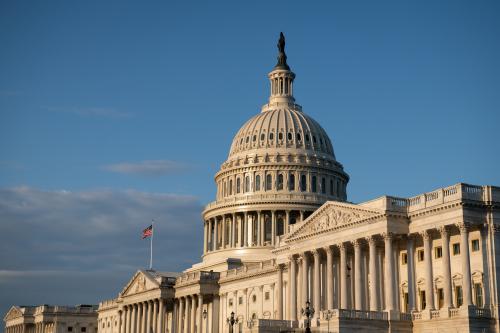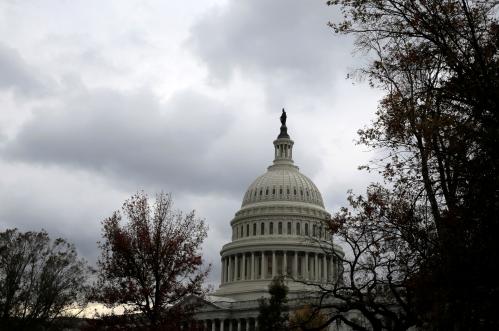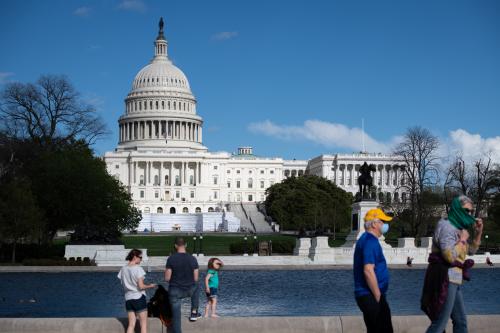In nearly every hearing throughout the President Trump impeachment saga, in both the Permanent Select Committee on Intelligence and the Judiciary Committee, Republican panelists have raised a point of order and stated some version of the following:
“Mr. Chairman, I have a point of order. House Rule XI, clause 2(j)(1) requires you to schedule a minority hearing day.”
The purpose of constantly raising such a point of order is straightforward: the Republican minority is making a parliamentary demand based on House rules that they be able to call witnesses to testify in front of the committee. Each time the point of order has been raised, the chairman has either acknowledged the point of order and stated that he will rule at a later date, or as in Monday’s impeachment hearing (49:07 mark of the video), responded with “That is not a proper point of order in today’s hearing.” In either case, the Republican minority has argued that ignoring their right to a minority day hearing has prevented them from calling witnesses such as Hunter Biden and is just another example that the impeachment procedures have been completely unfair to their party.
But how the Republicans have portrayed House Rule XI, clause 2(j)(1) isn’t exactly correct. Most importantly, the rule doesn’t grant the minority their own day for minority-called witnesses to testify. The rule does, however, entitle the minority to choose witnesses to appear before the panel on at least one day if a formal request is made by the majority of minority members. And if the request is made before one hearing is finished, the hearing must be continued another day to oblige the minority’s request.
Here’s exactly what the rule states:
Calling and questioning of witnesses
(j)(1) Whenever a hearing is conducted by a committee on a measure or matter, the minority members of the committee shall be entitled, upon request to the chair by a majority of them before the completion of the hearing, to call witnesses selected by the minority to testify with respect to that measure or matter during at least one day of hearing thereon.
The rule was adopted within the Legislative Reorganization Act of 1970 as a means to guarantee that the minority’s position of a given issue is represented by witness testimony before congressional committees. The rule is rarely invoked, however, because committees are typically able to accommodate minority witness requests prior to the point of order being raised during a committee hearing. In fact, this accommodation process has already occurred during the first House Judiciary impeachment hearing when the Republican request for Professor Jonathan Turley to testify was granted without formally invoking the minority witness rule.
Though the rule codifies the minority’s right to select their own witnesses, several points are important to keep in mind for how the rule plays out in practice if and when it is invoked. First, despite the minority calling their own witness(es), the majority and its chair maintains firm control over the hearing’s proceedings, including the date, time, and rules covering how the witnesses are questioned. The chair can limit to questioning to the minimally required five minutes per member and can even include their own panel of witnesses to minimize the time spent questioning the minority called testifiers.
Second, as with all congressional hearings, Rule XI section 2(k)(8) states the “committee is the sole judge” as to whether a witness’s testimony is relevant to the committee hearing’s purpose. This means that should minority proposed witnesses provide testimony that a majority of committee members finds irrelevant or not germane, they can vote to adjourn.
Finally, there is no hard deadline for when the chair has to schedule a hearing involving the minority identified witnesses. As outlined in the House Manual, “The chairman may set the day under a reasonable schedule.” Reasonable schedule is not defined, giving the chair much discretion as to when he satisfies the minority request. One can bet it will not be scheduled at a date or time picked by the minority.
But, all of this discussion regarding the minority’s right to call their own witnesses to appear at an impeachment hearing may very well be moot. For the impeachment inquiry specifically, by a vote of 232-196 the House agreed to H.R. 660 which outlines the committee procedures to be used in impeachment hearings. Vital for this purpose, section 4(c)(1) of the resolution states that the ranking member of the committee is authorized to choose witnesses for testimony, but with a critical caveat: the chair of the committee must concur with the ranking member’s choice. That is, without agreement from the Democratic chairman, the ranking member’s prerogative in this matter is effectively null.
In theory, the procedures outlined within H.R. 660 supersede those itemized within Rule XI of the House rules. Should the Republicans wish to challenge this interpretation, they would offer a question of privilege on the House floor that states their minority rights to call witnesses were steamrolled by the majority within the committee. While Democrats would be unable to stop this question being put to the House, they would undoubtedly respond with a motion to table by a simple majority vote, which would effectively kill the complaint.
In the end, whether because the Judiciary Committee votes on articles of impeachment prior to hosting formally requested minority witnesses or because the procedures outlined in H.R. 660 render the minority witness rule moot, Republicans are unlikely to get their witnesses to testify before the committee. This reality is just the latest example of why majority status is so critical within a majoritarian institution such as the House of Representatives.
The Brookings Institution is committed to quality, independence, and impact.
We are supported by a diverse array of funders. In line with our values and policies, each Brookings publication represents the sole views of its author(s).







Commentary
The minority witness rule explained, and why it might be irrelevant for impeachment
December 12, 2019